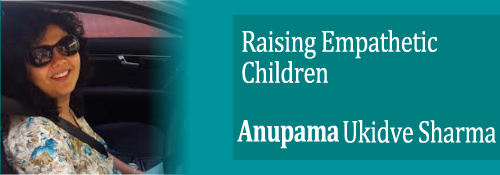Raising Empathetic Children
‘An empathetic person is someone who can share another person’s feelings. If you tell an empathetic person that your heart is broken, she might touch her own heart and gaze at you sadly through moist eyes.’
I personally feel the world is going through the toughest times we have known so far. Everywhere we look, there seems to be tragedy and heartbreak, either created by man (think terrorism), or entirely accidental (premature death due to accidents and illnesses) or as a result of the havoc that nature wreaks at times when she thinks she can’t take it anymore (think earthquakes and floods). Or is it that every generation goes through this and feels they have it worse than anybody else?
Whatever the case maybe, the fact remains that it is our children who have to live and grow through these times and it is best if we aim to make them warm, caring, empathetic individuals who can put themselves into another’s shoes at a moment’s notice and behave accordingly. For remember, bad times do not book an appointment with you but come like uninvited, unwanted, detested guests.
I have friends who have lost husbands to cancer, brain tumour and road accidents. I also have friends who have lost children in a few months and a few years after birth to congenital illnesses, an accident at home and in a car crash. My son has friends who have lost dads to cancer and tumour, has a friend who lost his mother in a terrorist attack and was severely injured himself and has a friend who lost a sibling in a tragic accident at home.
While speaking to friends who have tragically lost husbands and have young children to raise, they mentioned one of the worst aspects of the tragedy. Their children are teased and taunted by peers as young as five and six years old, for not having a father! This phenomenon was seen across different cities, in differing socio-economic groups and shocked me to the core. What kind of monsters were we raising that they found fatherless children fair game? More importantly what were the parents doing?
My son was five when his six year old friend lost his Dad, after a yearlong battle, to cancer. One of the first things I did was to explain to my five year old what had transpired while cautioning him NEVER to ask his friend “What happened? Where is your Dad now?” And after a few months, “Do you even remember your Dad?” I explained that his friend would talk about it if and when he felt ready and it was not our business to ask anything but just to be a good friend and play when he felt like it or be with him even if he did not feel like playing.
If your kids have friends in similar situations, do take time to sit down and talk to them. Good behaviour and etiquette are not imbibed magically. They are children after all and are naturally curious about what they perceive is not a very usual occurrence. It starts with questions like the ones I’ve mentioned above and when the affected child naturally does not deign to answer them, the peers resort to cruel taunts and hurtful teasing.
For slightly older children, explain that silent support is the best. Tell them NOT to say, “Oh I know exactly how you feel.” No, you CANNOT know, because by God’s grace you have not lost a parent or a sibling the way your friend has. Instead, tell your children to put up with the vagaries of their friends’ moods which will fluctuate wildly, especially in the first year following the tragedy. Little cards and gifts for their friends which tell them they are there for them are fine. Again, the no questions rule remains rigid for this age group as well. You can tell your child, “If your friend wants to tell you, he or she will. Just listen patiently then and let your eyes and your positive actions, not your words, speak volumes.”
You can help your child support and empathize with his or her friend by occasionally inviting the child over to your house. Find out what the child likes, cook it for them, talk about happy, funny events, even as you stem your own tears. Be genuine and natural, for children are quick to perceive fake sympathy and barely hidden curiosity.
Remember your own child is watching you as well and children learn what they see. Children who have gone through unspeakable tragedy often need a safe haven outside their own house and if you and your child can create one for them in your own home, why not? This way you also become a role model for your own child and these are lessons the children will carry with them throughout their lives. For who knows what awaits just around the corner for any of us?
It requires a very high level of empathy to not even blink an eye when you are told one day, during lunch break in school, by your friend who has lost a sibling in a matter of minutes, “Eat your dessert first, for you never know when you will die.”
Kudos to my son, who respected his friend’s wishes and gobbled up his dessert first and then ate lunch….No questions asked…There really are no answers to some of life’s events.
Meet Anupama – An archaeologist by qualification, an educational entrepreneur by profession, a linguist by inclination, a writer by vocation! I am a mother of an eleven year old son and a seventeen year old daughter. Currently based in Kenya due to my husband’s job, I manage my Academy in my home town Pune from across the ocean and continue teaching on Skype. To know about my life in Nairobi, memories from India and anything and everything that touches a chord with me, do read my blog: www.kenyankronikals.blogspot.com
